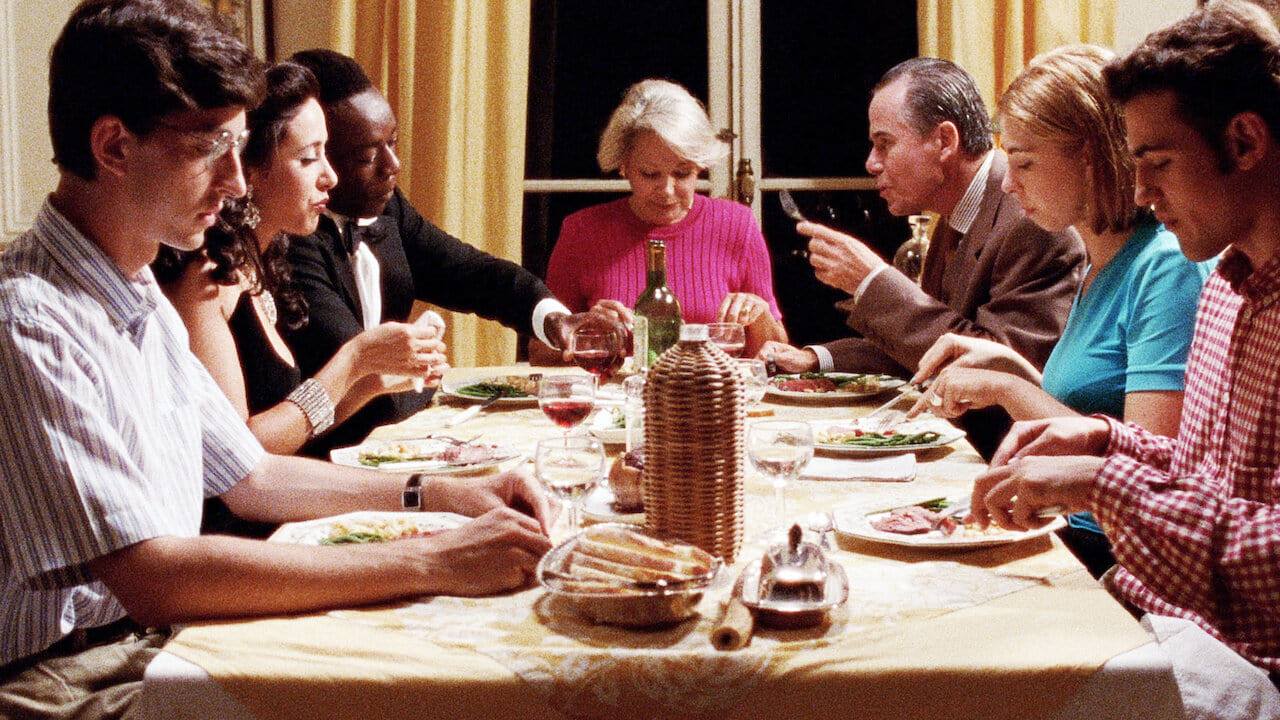

Before seeing Sitcom, the only Francois Ozon films that I had any experienced of were the musical farce 8 Women and his Fassbinder adaptation Water Drops on Burning Rocks. Both of these films were interesting, but completely different, both in terms of style and content. It is through this particular film - his debut of sorts - that we can find a link between these two rather disparate projects and can also, better understand the various themes and motifs that have reappeared in subsequent Ozon works, like Criminal Lovers, Under the Sand, 5x2 and Swimming Pool.This film effortlessly establishes Ozon's strengths as an "ensemble" director, as he introduces the idea of bourgeois characters bound together in a claustrophobic location (a familiar idea that will be repeated in 8 Women and Water Drops...) whilst all manner of catastrophe, farce and inter-family relationships are explored and exposed with a cynical (...and, to some extent, satirical) glee. I suppose in some respects, this film is similar to Luis Buñuel's The Discreet Charm of the Bourgeoisie (though there are also allusions made to other Buñuel projects, like Belle de Jour and The Obscure Object of Desire), with added nods to filmmakers like John Waters and Michael Haneke (albeit, a less po-faced rendition of Haneke's key-themes) thrown in for good measure.The film is darkly comic, deranged and completely absurd in the best possible way... the plot focusing on a polite, conservative French family, who each succumb to their own sexual perversions after dad brings home a pet rat (yes, you read that correctly!!). Moments after the little fella has been transported into his new home, the son announces he's a homosexual (and then, seconds later, retires to the bedroom with the maid's athletic husband), the daughter throws herself out of the window and ends up a paraplegic (...she later takes to putting out cigarettes on her bare arms and whipping her boyfriend during kinky S&M), while later in the film, mum turns to incest in an attempt to "turn" her wayward son whilst dad tries to disregard the whole thing as "just a phase". The whole film is completely outrageous and very funny, with Ozon keeping the viewer's attention through the use of brisk editing, colourful composition and some completely extreme sight gags (the sun's metamorphosis from bespectacled nerd into an outré gay-icon, the disabled daughter dragging herself up the stairs with a knife between her teeth, like one of Tod Browning's Freaks and, my personal favourite, mum walking in on one of her son's gay-orgies, only to find a group of leather-clad muscle men playing a polite game of cards).Ultimately, the film is very frivolous and doesn't really carry much weight as a successful social satire, but it's wholly enjoyable (if you're in the mood for it) and most certainly will leave an impression on anyone who watches it. The performances are strong throughout, and it would be wrong to pick favourites from such a tight ensemble, whilst Ozon's unpretentious direction has a confidence and self-absurdness about it (though it obviously lacks the polish of later efforts like 8 Women and Swimming Pool). I personally felt that the film fell apart a bit towards the end (much like a lot of Buñuel's work too), with Ozon seemingly attempting to riff on Kafka's The Metamorphosis, whilst still trying to retain that sniping sense of social satire (the scenes between the mother and her physiatrist gave a good back-bone to the narrative, and also brought to mind similar scenes in that other darkly-comic classic, Harold and Maude)... it doesn't really work, and is a bit of disappointment, especially after that amazing and literally jaw-dropping opening, and the subsequent madness that occurs in-between.Like the aforementioned Discreet Charm..., Sitcom is a film obsessed with false endings and double pay-offs (there are at least four possible endings for the film, including the one that opens the film, and, the more disappointing one that actually does end the film), though despite the disappointment connected to the eventual dénouement, I would still recommend this film as one of the standouts of the last decade. Sitcom is a blistering and enjoyable dark-comedy farce, acting as a lighter, more comedic take on the new European extreme of filmmakers like Lars von Trier (Breaking the Waves, The Idiots) and Gaspar Noe (I Stand Alone, Irreversible).
... View More"Sitcom," above all, requires a large grain of salt: it is visually shocking and provocative, and American audiences in particular often dismiss it as a "vulgar" film on these grounds. The plot, however, contains an allegorical richness that is rarely attained in most modern films. It is a theater of the absurd, and must be understood as such in order to comprehend the complexity of meanings and social commentaries it has to offer. For starters, it is a criticism on the most basic level of the social alienated embodied by bourgeois social standards in France. One of the most accessible aspects of this commentary is the unwillingness of the characters to genuinely communicate to one another. While this makes several scenes totally hilarious, at the same time it micro-cosmically calls into question the validity of a "coherent" unit to address its internal problems; this is, obviously, an allegorical reference to France as a nation. The nation--like this bizarrely self-contained familial unit--is unable to progress and modernize in accordance with modern needs because of a lack of communication. The abstract issues of race, homosexuality, insanity, and even modern psychiatry are called into question. The modern cannot be a museumization of the past, despite whatever aesthetic benefits such staticness might offer. It would be a good idea before viewing this film to read Freud's "Totem and Taboo." Despite the fact that no scholarly connections between the film and this work in particular have been made, it provides at least some provocative insight into the plot. I would also suggest against making a viewing of this film a family event; it would be most appropriate among those of an older age group, and is a particularly provocative piece of French film.
... View MoreThis is an odd film about a father who brings a pet rat home to his family, which then sparks off their innermost sexual desires. The son announces he's gay, and ends up with a maid's boyfriend; the daughter jumps out of the window and is paralysed, and then gets her boyfriend to hurt her while she puts cigarettes out on her arm. The wife starts to sleep with the gay son. The daughter asks her father to have sex with her, but he declines, saying she's ugly. The ending is really surreal. Wacky, satirical, perverse & crazy. See it if you can.
... View MoreThis film is, above all else, a farce. As a farce it works very well and is, in many parts, extremely funny. A regular in Ozon's films, Lucia Sanchez, is excellent as the Spanish maid, and the mother is played to utter perfection by Evelyn Dandry. She is able to portray the utter frustration of any woman with teenage children. Ozon doesn't really cut new ground with this film, with its theme of the disruption of French bourgeois family life, but I don't think that he intends to. The film is funny on its own terms. The notion of Ozon being 'naughty' shines through. Of course, the utter beauty of Stephane Rideau makes the whole thing worthwhile by itself.
... View More